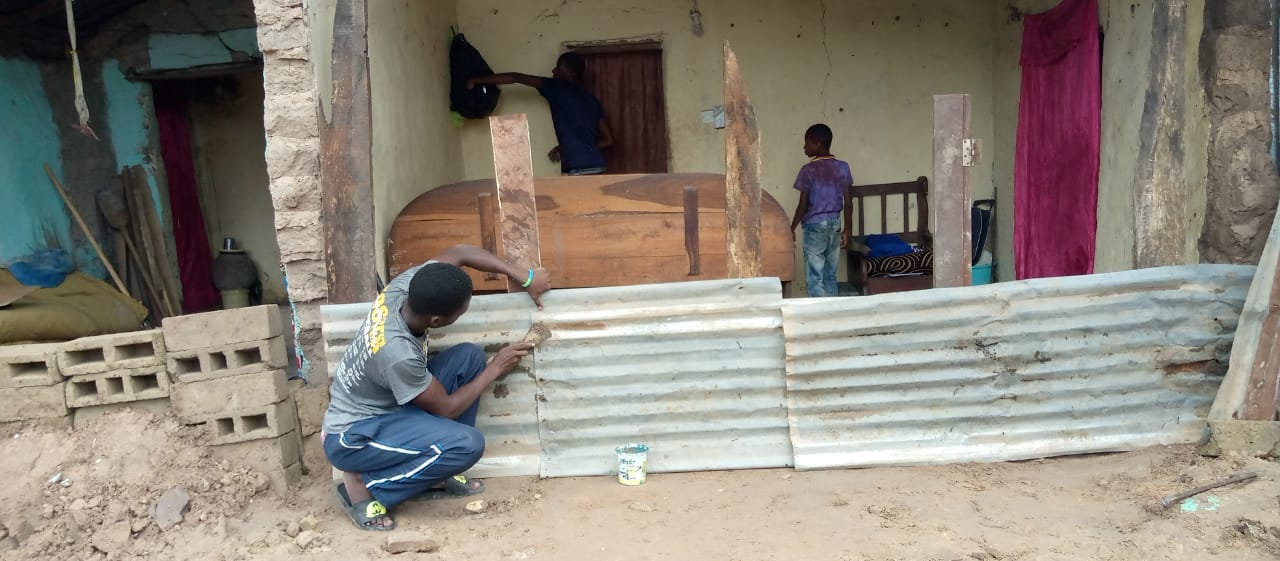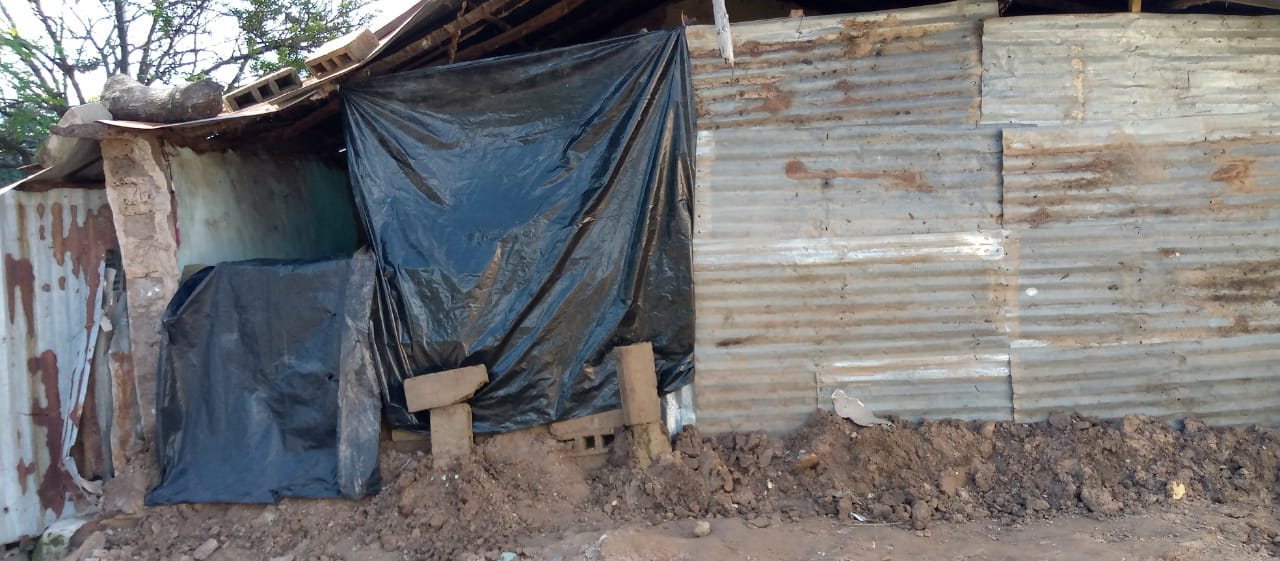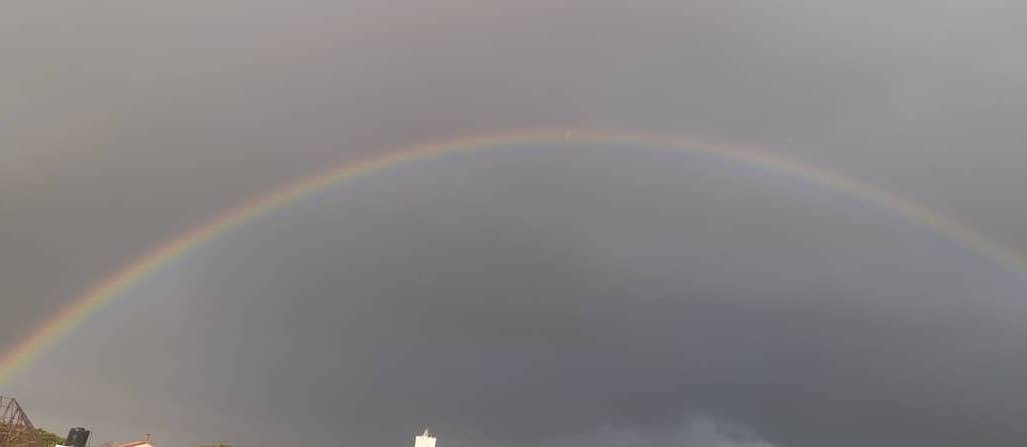As previously noted, Patrick’s landlord booted him and his family from their apartment last month. He was unable to find alternate lodging in the city of Brikama. So his family moved back to the dirt-poor village of Kerr Amadou on the north bank of the Gambia River, not far from Senegal where he had hoped to travel with his class at the end of July before everything derailed. Life in Kerr Amadou is difficult at best—there is no market and the nearest city, Barra (pop. ~5,000), is an hour away from the nearest road junction by commercial vehicle. The junction itself takes an hour to reach by foot. Even in Barra food is hard to find, as fishers aren’t working much in the bad weather.
The weekend before last a large part of the area suffered severe flooding, making everything exponentially worse. Late in the week Patrick decided to risk a trip to Barra to try to find protein. He never made it there and his phone—his sole connection to the world outside Kerr Amadou—was damaged by moisture. He’s still able to communicate with me by voice messages, but can barely make out what is on the phone’s screen. Granny is sick with some unknown stomach ailment, and Patrick has a boil on his ear.
It’s anyone’s guess how he’s going to deal with all of this, but thanks to his growing ranks of subscribers he at least has enough money for a new phone. He doesn’t want to buy one in-country because they are all second-hand at best and we feel it would be important for him to have something that a) is water-resistant, b) has a decent camera, and c) won’t have to be replaced in a year. Fortunately refurbished iPhone X’s can be had here in the U.S. in his price range, and they fulfill all of those requirements. So I’m ordering one and will send it to him via DHL. We’ll be largely incommunicado for at least a week but I have a stack of short pieces from him so publication will go on.
In recognition of his recent struggles, and with an echo of catastrophic flooding here in the U.S., I transcribed his account of this great disaster, which might otherwise be almost entirely invisible outside West Africa.

Floods are always a disaster even in some parts of the developed world. Floods are something beyond reason, and there’s no way control or predict the outcome. The 30th of July is a day that will live in the hearts of many destitute and unfortunate Gambians who were victims of this flood, with lots of destruction and heartbreaking moments.
Gambia, with a population of about two million people, is known as the Smiling Coast of Africa. We have a sub-tropical climate with two seasons: rainy and dry. Rainy season begins in mid-May and lasts until late September and during this period farming takes place and everywhere is green because grass grows all over. Dry season begins in October and runs to May.
Personally there is no difference because struggles and hard moments come day and night. The majority of the youth are unemployed and many are destitute, striving to bring dreams to reality. In these trying times a person who is responsible is considered brave when he is able to provide basic needs for his family.
The 30th of July was an unpleasant day that will remain in the hearts of Gambians. There was continuous heavy rain from morning of Saturday the 30th to the ending of Sunday the 31st, causing the worst flood in decades. Houses were full of water. Heavy thunder and lightning forced the government to turn off the electricity because of the danger of damage and destruction to those who have electricity in their various homes. The water was above the head of a typical five-year old human being. Places near me in the village have fallen down. It was a sleepless night and day for poor Gambians. Many houses fell down with their roof thrown off the side and some lost just a side of the house. The lucky ones are those who build their house with cement blocks—in this case water only goes inside their house but doesn’t bring the building down. But people living in mud houses such as us experience the fall of houses. Many materials were carried away by the flood, even domestic animals and cooking materials.
In the morning neighbors visited each other to offer service and I am glad I was able to do my best to help three different families build a temporary house by nailing iron sheets to wood. There are other families joined together because it is not possible to start to build a house in the rainy season. Food is a problem and many wells collapsed. Some of the animals carried by the flood died in wells. The government hasn’t provided aid to victims of the flood at the moment they are struggling with basic needs such as food, shelter, and clothing.
Ordinarily at this point I would ask Patrick questions about what he’d written and post his answers here but obviously that’s not in the cards this week. I can’t say he didn’t see it coming—only a few days before our communication was reduced to a short daily voice message I asked him if he was going to Barra soon. He told me:
I always want to go to Barra but it's not safe in rainy season and am trying to protect my phone from getting wet. It's difficult to get a car during the rainy season here so I use my bike [this bike was my birthday present to him last April] to get to other small places to search for fish but it's just different because the fishermen say fish are limited. In rainy season they aren’t regularly in the sea because rain can come at any time.
Earlier we were discussing water purification methods and he said:
Yes that will be very helpful. Some wells are very dirty and one behind us has a snake in it. It's sad that people drink from it.
I told him I thought that was crazy, and he responded:
Only God protects life here; it may sound strange to you.
I’ll be frank here: I’m worried about Patrick and his family. I’ve struggled to help him with his problems in large part because solving problems is my career and I’m drawn to those sorts of problems where solutions seem clear to me, I guess on the grounds that I don’t like to see solvable problems simply ignored. It’s like leaving litter on the ground. Patrick has been an excellent, hard-working partner in this venture, and not simply because he has no choice. He has a wellspring of curiosity and a solid, almost superhuman work ethic. It seemed to me at times in the early summer that one day he might even wind up in school here in Atlanta, pursuing a master’s degree from Georgia State.
What is really pernicious about this sort of poverty, though, is its relentlessness. The problems keep coming; they are surprising; they resist simple, straightforward solutions. It’s a tired metaphor but I can’t stop thinking about sand castles.
Patrick weathered years of trouble without me, so I suppose odds are he’ll make it through this, but he’s right, only God protects life there. Or chance, if you prefer—it’s a crap shoot even for the talented and determined. And he’s one of millions in such dire straits. How do people cope with this? How do they put up with it?








💔Stay strong, our brave friend. We’re all thinking of you.